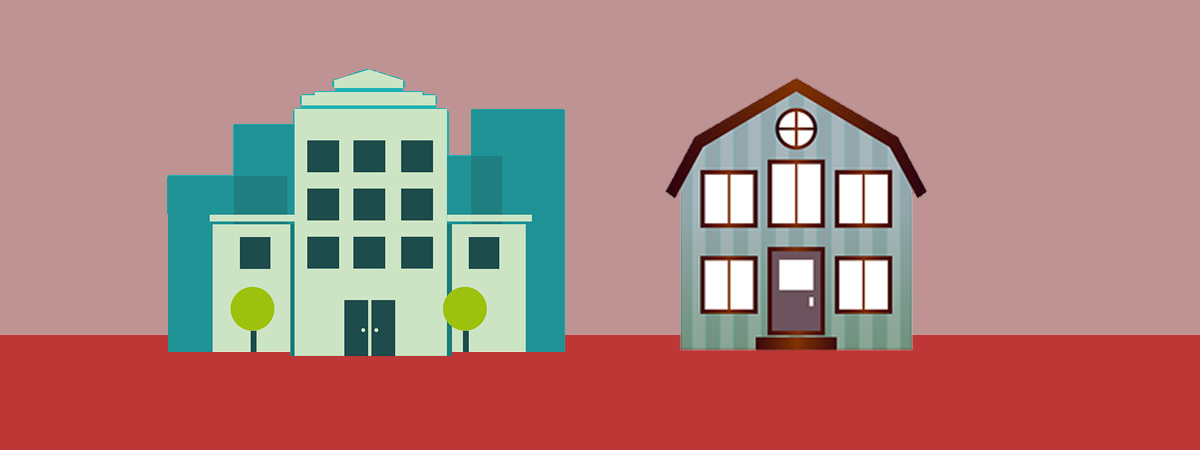
Leasehold and Freehold are types of property ownerships in England and Wales. It goes without saying, it’s extremely important to know the differences between the two when buying property.
Most will be familiar with the terms freehold and leasehold (although you may not necessarily know what they mean). “Commonhold” is another type of property ownership which you may not be aware of. They’re not as common, but you do come across them now and then…
Freehold Property
When purchasing a “freehold” property, you are buying the outright ownership of the property and the land on which it stands, and the entitlement to permanent residency for as long you wish.
As the “Freeholder”, you are entitled to make moderations to the property within restrictions of the law and planning restrictions. You may need permission to make structural changes, particularly with listed buildings (old buildings).
Most houses in England and Wales are sold freehold. Flats can be sold freehold, but very rarely, they’re usually leasehold. However, flats are increasingly becoming freehold because of a legislation that is making it easier for leaseholders to buy the freehold.
Flying Freehold
You may have heard of “flying freehold”, but never really known it’s meaning. A flying Freehold is the part of the freehold property which overhangs land which does not form part of that property freehold.
A common example of a flying freehold is a room situated above a shared passageway in a semi-detached house, or a balcony which extends over a neighbouring property.
Flying freeholds are quite common, but not many homeowners even realise they have a one. They are a bit of a grey area in the eyes of the law; they’re viewed as a title defect. Reason being, they typically don’t have rights of access to make repairs. For example, a balcony that overhangs onto someone else’s land may need some repair work, but in order to make the repairs, you may need position from the freeholder in order to get underneath the balcony and onto his/her land to make the necessary repairs.
For these reasons, it’s become notoriously difficult to get mortgage lenders to finance the purchase of a property that comprises a flying freehold situation.
Leasehold Property
If you buy a leasehold, you are actually buying the property for a period of time, hence the “lease” Unlike a freehold, you aren’t buying ownership of the property or the land the property stands on.
Most flats in England and Wales are leasehold. They are subject to ground rent, which is payable to the freeholder. The ground rent will cover the costs for communal maintenance repairs. Also, bear in mind, ground rent generally increases with inflation, but in most cases that’s not the contractual policy, so ensure you find out the policy on increases and if there are any caps (i.e. a limit to how much the ground rent can be increased by).
The lease should stipulate how the service charge is worked out, and how it is divided between the other leaseholders. It’s important to calculate all these costs before committing to a leasehold property, as you may not have budgeted for the additional costs.
Once the set period in the lease expires, the ownership of the property is given back to the freeholder. Most leases are approximately 99 years. However, leases may be extended by agreement with the Freeholder at a specified cost. Leases of 999 years are becoming more and more common.
If you’re planning to buy a leasehold property, it’s important to find out how many years are left on the lease and what the ground rent/service charges are. Please note, if the lease has less than 75 years, many mortgage companies won’t offer a loan on it. The lease can be extended, but there’s a cost associated with it, and the shorter the lease is, the more expensive it generally is to extend. If the lease period is short, the asking price should reflect the cost to extend the lease.
Whatever the case, it is important to read the lease carefully, and also have someone qualified look over it. You should be fully aware of all the details, particularly the cost of extending the lease (if it’s a short lease), if you can secure a mortgage on the lease, and how much the ground rent is, and how often/easily it is for the freeholder to change the rates.
Commonhold Property
Commonhold is a relatively new idea; it was introduced at the end of 2004. Like leasehold properties, they’re typically found with flats and units.
Commonhold is pretty self-explanatory. A group of people mutually own, for example, a block of flats. There is no overall landlord. However, there is a freehold owner, and that is a company called a commonhold association. The owner of each flat is a member of the association (i.e if you buy a commonhold flat, you will be part of the association). The commonhold association is responsible for maintaining the communal areas of the building.
The advantages of commonhold are as follows: there is no set period of time when you have to leave- you are one of the freeholders. All decisions regarding the building are made jointly by the property owners. There will be a standardisation of documentation which is the same throughout all commonhold properties- there will be no input from a dodgy landlord. And what appeals to people the most is that with commonhold, the property won’t lose value, unlike with leasehold properties that lose value as the period of the lease gets closer to its expiry date.
Leaseholders can convert to commonhold, but every leaseholder will have to buy the freehold together, and everyone in the building must agree to convert to commonhold.
Most strikingly, commonhold eradicates the concept of a lease and having a landlord. That’s what most appeals to buyers, and why it is favoured over leasehold.
Disclaimer: I'm just a landlord blogger; I'm 100% not qualified to give legal or financial advice. I'm a doofus. Any information I share is my unqualified opinion, and should never be construed as professional legal or financial advice. You should definitely get advice from a qualified professional for any legal or financial matters. For more information, please read my full disclaimer.


 Landlord Products / Services
Landlord Products / Services






























i bought a flat in 2007 with a absent free holder. in oct 2009 i was asked by the new free holder to pay my ground rent, but he has also demanded the ground rent for the two years prior to him taking over the free hold under the principle of "privity of contract" do i have to pay this ?